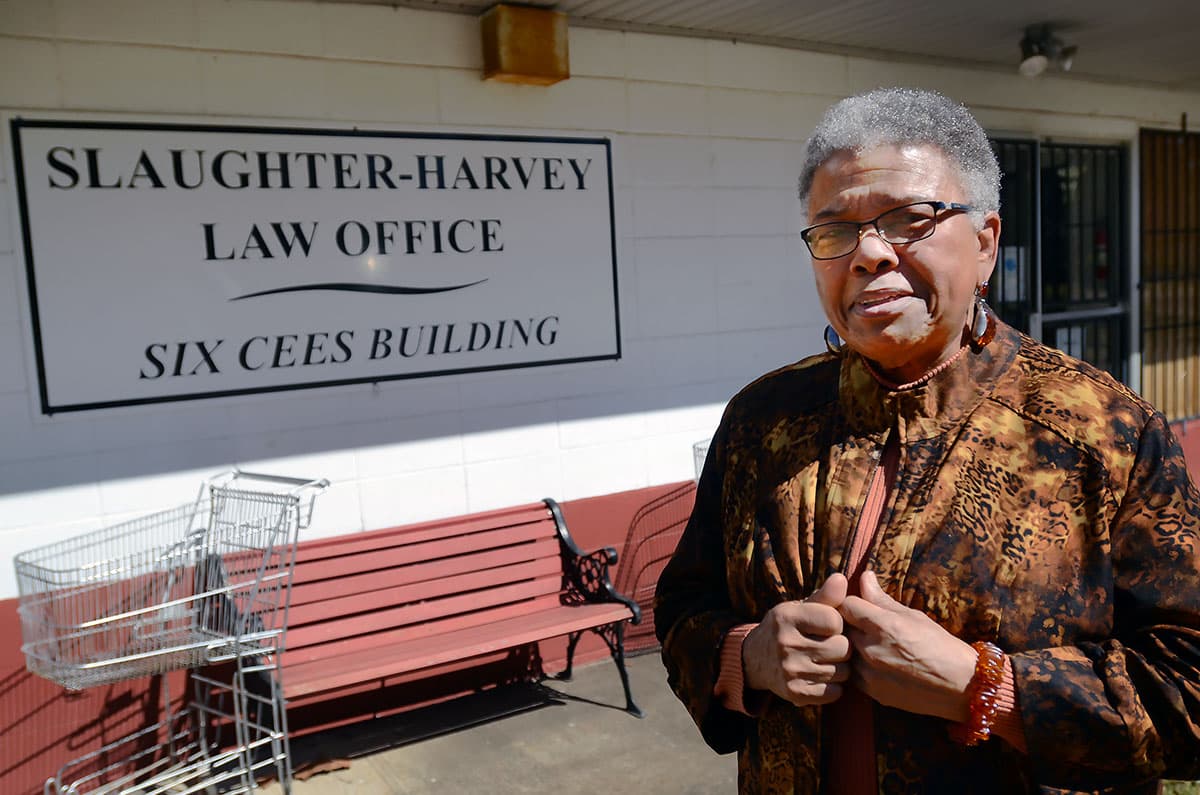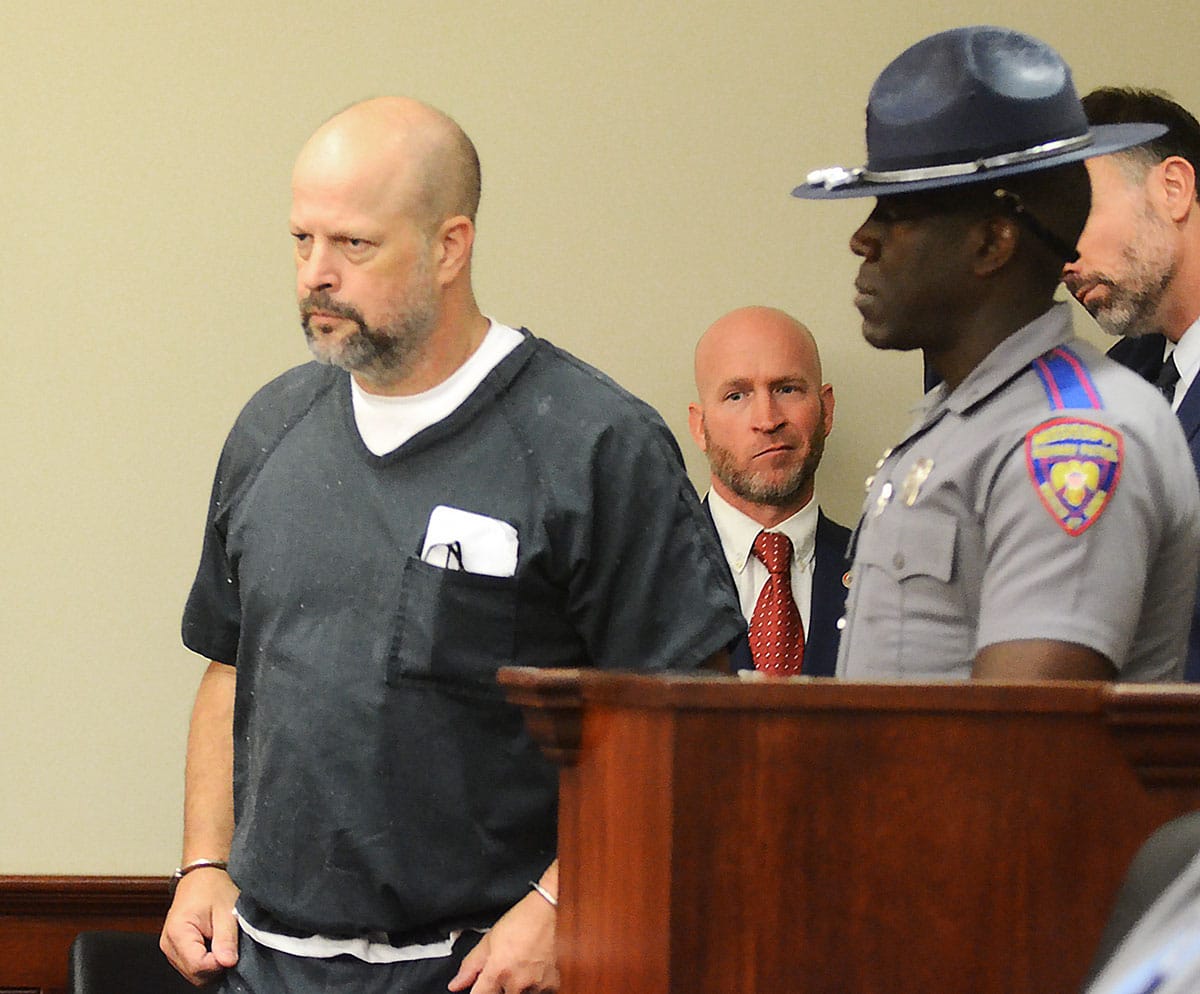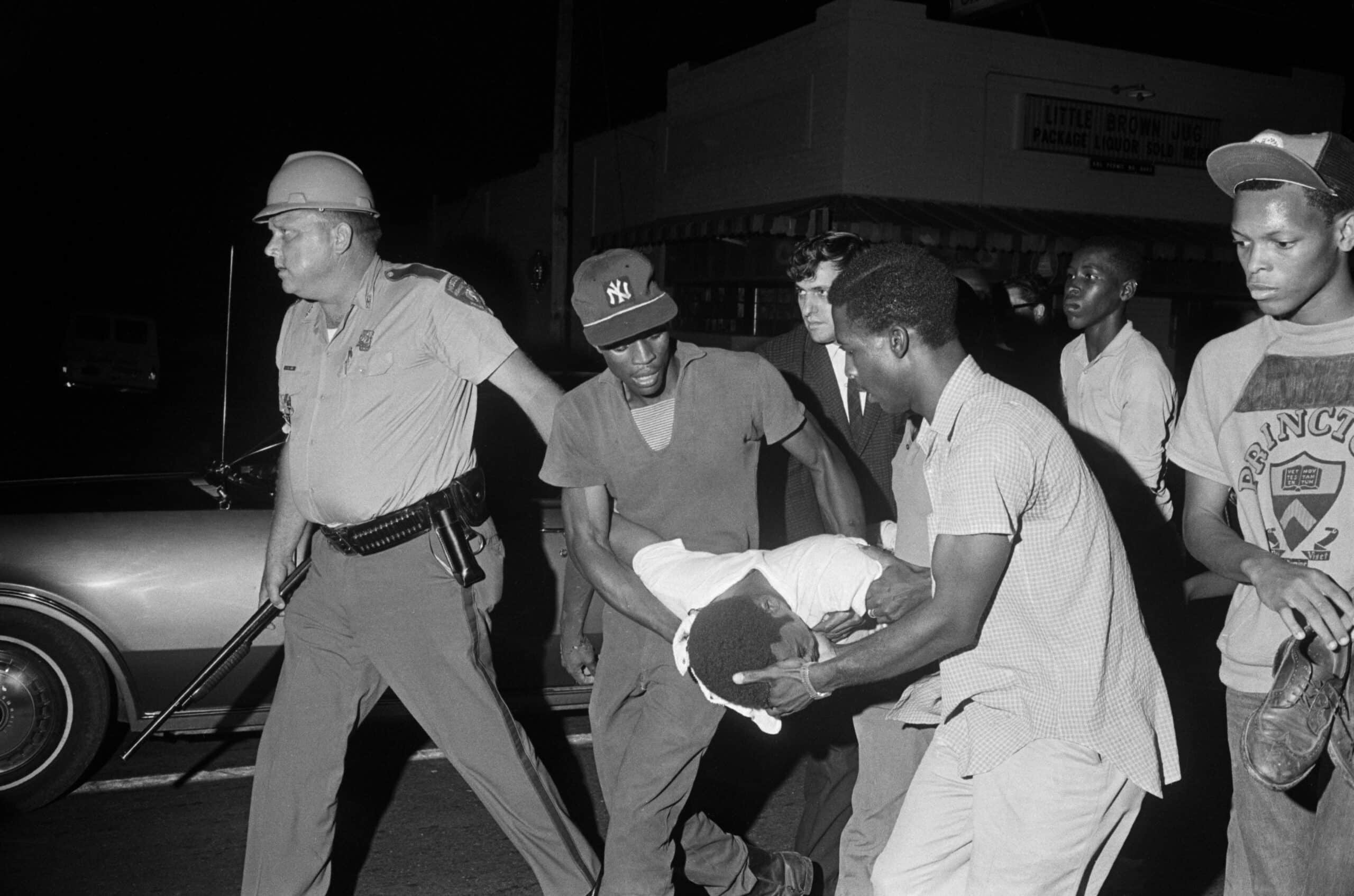Mississippi Today
Rankin sheriff says he learned at the knee of a former Simpson County sheriff, Lloyd ‘Goon’ Jones

The law enforcement official that Rankin County Sheriff Bryan Bailey regards as his mentor had a reputation for terrorizing Mississippi's Black community.
His name? Lloyd Jones.
“Of all the law enforcement officers I have ever questioned, he was the most detestable,” said Constance Slaughter-Harvey, who served as an assistant secretary of state for Mississippi. As proof, she pointed to his 1970 deposition, where he repeatedly said “n—–” and then defended his use of the racist slur.
Now Sheriff Bailey is under Justice Department scrutiny for his office's “Goon Squad,” which terrorized two Black men, hurled racial slurs at them, used a sex toy on them and shot one of them in the mouth.
On Nov. 30, The New York Times and the Mississippi Center for Investigative Reporting at Mississippi Today revealed a disturbing pattern of violence by Rankin County deputies stretching back two decades. Reporters reviewed dozens of allegations and corroborated 17 incidents involving 22 victims based on witness interviews, medical records, photographs of injuries and other documents.
The brutality harkened to the Jim Crow days when some law enforcement officers carried out violence in the name of preserving the Southern “way of life.”
Between 1956 and 1975, Lloyd Jones worked as an inspector at the Mississippi Highway Patrol. Civil rights leaders gave him the nickname “Goon,” and the nickname stuck.
The Justice Department concluded that Jones killed Ben Brown in 1967. Brown, who had been involved in the civil rights movement, happened to walk past a standoff between law enforcement officers and protesters near the Jackson State University campus.
The FBI quoted Jones as telling a coworker that he killed “the n—–” with his 12-gauge shotgun, took it home, cleaned it, wrapped it in a blanket and hid it in his attic. He admitted in a sworn statement that he fired his shotgun 10 or 15 times that night.
Three years later, Jones was over state troopers who, along with Jackson police, responded to a protest on the Jackson State University campus. Law enforcement officers fired more than 400 rounds of ammunition in less than 30 seconds in every direction, many of them into a women's dormitory.
Jones declared under oath that a sniper had fired at troopers before they unleashed their barrage of bullets, but journalists and some Jackson police officers testified they witnessed no such sniper fire.
By the time the gunfire ended, two young men were dead: Phillip Gibbs, a political science major who was married with two children, and James Green, a Jim Hill High School senior who was walking home from work. A dozen others were struck by bullets but survived.

When the Rev. John Perkins led activists on a Feb. 7, 1970, civil rights march in Simpson County, Jones had 14 troopers watching their every move, according to court documents.
Fellow activist Doug Huemmer was arrested on a charge of reckless driving. He said a trooper had already told him that if he didn't leave Simpson County, “he would kill me.”
Troopers hauled Huemmer and other activists to the Rankin County Jail. When Perkins heard the news, he headed that way.
After arriving at the jail, Perkins and Huemmer said they and other activists were brutalized by then-Rankin County Sheriff Jonathan Edwards and other law enforcement officers. (An appeals court judge had already concluded that Edwards and his deputies beat Black Mississippians who attempted to vote.)
Huemmer said that, after one officer whacked him four times with a blackjack, he “saw stars” and fell to the floor.
While being held in a different room, Perkins said Jones kicked him and told him, “We could have killed you a long time ago.”
He said he balled up to protect himself from blows to his head and groin. One officer shoved a fork up his nose.
Perkins said another officer jammed a pistol against his head, and he thought he was going to die. The gun clicked.
The harassment didn't stop after their release. Six months later, Huemmer was jailed in Rankin County again, this time after making a U-turn. He said the judge was going to let him go — until the judge found out he had been involved in the Mendenhall protest and ordered him put behind bars.
Huemmer said he and Perkins became victims, not just of “a racist paradigm,” but of the authority given to Southern sheriffs following the Civil War. “Sheriffs filled a power vacuum,” he said, “but the system rotted and became corrupt.”
In 1976, Jones became sheriff in Simpson County, where the Perkins' family lived. A sense of fear and terror pervaded the Black community, said Perkins' son, Derek. “People were afraid. They knew he could go inside their house and arrest them. I've seen that done.”
The FBI quoted Jones as saying, “Those n—–s don't mess with me in Simpson County because they know I will put them in their place.”
Mary White, who served for decades as secretary for the Simpson County NAACP branch, described that time as “rough on Black people.”
The NAACP collected allegations of the beatings of Black Mississippians or of having drugs and guns tossed inside their cars, she said. “We got calls on a lot of different cases.”
Perkins' daughter, Priscilla, recalled Jones entering their Simpson County home with two other white men just as dawn was breaking. Not knowing what else to do, she pretended to sleep.
News of a new “Goon Squad” has resurrected nightmares for the Perkins family.
“The Goon Squad was eerily similar to 53 years ago when Rankin County officers tortured my father and beat him in the Rankin County Jail in February 1970,” said Perkins' daughter, Elizabeth. “The spirit of ‘Goon' Jones lives on through the Goon Squad. We've got to break this Rankin County Goon Squad cycle.”
In the early 1990s, Bailey got his first job under Jones, who had survived a shooting a few years earlier. Deputy James Barnett was killed in the incident. In 1995, Jones became a murder victim.
After the slaying, Bailey appeared on television to praise his boss. “He worked seven days a week, 12 and 14 hours a day, and he wouldn't ask us to do anything he wouldn't do hisself [sic],” he said. “It's an honor for me to work with him.”
Twenty years later, Bailey posted on Facebook that Jones was his mentor and wrote: “You had such an influence on my life and my career in law enforcement … you are no doubt a part of who I am and what I am today. I loved you like a father and I still miss you so much. I remember and use everything you taught me to this day.”

Slaughter-Harvey worked as one of the lawyers who brought the litigation against Jones. She still remembers the lawman glaring at her when she questioned him in Rev. Perkins' lawsuit.
“He looked like he could kill me,” she said. “John Perkins forgave him, which is more than I can do. I can try to forgive him, but I can't forget.”
In 2014 and 2015, a series of police pursuits of suspects from Rankin and other surrounding counties into the capital city made headlines after some car crashes led to injuries and deaths. Jackson Police Chief Lee Vance told the Clarion Ledger that “chasing people down busy streets during a busy time of day, pursuing misdemeanor suspects is something I don't agree with.”
Jackson City Councilman Kenny Stokes drew national attention when he suggested that rocks, bricks and bottles be thrown at officers who chase misdemeanor suspects into Jackson.
Sheriff Bailey responded angrily that Rankin County citizens elected him “to keep them safe. That's what we're going to continue to do.”
He told Therese Apel, now CEO of Darkhorse Press, “The day's not going to come where people think they can commit a crime in Rankin County and race back to Jackson …. We're coming after ‘em. They started this. We didn't. They came over here and committed a crime.”
He told Stokes to “keep those thugs over in the ward with him. … In my opinion, Kenny Stokes represents everything that is wrong with the city of Jackson and why it's going downhill. … He says this is racism. Yes, it is racism — racism against every officer, against every deputy who bleeds blue. Just makes me sick for him to incite hatred and violence against the officers.”
Stokes is “standing behind his city limits in Jackson and talking all his big talk,” Bailey said. “I challenge him to cross this river, and I'll drive my car over there and let him throw a rock at me. I'll have him picking up trash on the side of the road for the next few years.”
He said if any Rankin County officer “gets hurt over there, we're going to do our best to take everything he has — his state retirement, his paycheck and everything else.”
On Feb. 7, 2017, Bailey joined one of those chases after carjacking suspects and fired his gun into a fleeing vehicle. The bullet went through the rear passenger door and hit a teenager.
Former deputies say Sheriff Bailey remained obsessed with Braxton, a village of less than 200 where Jones once lived. Part of the community is in Rankin County and part of it is in Simpson County. Bailey grew up in the nearby village of Puckett, where he graduated high school in 1985.
Deputies had responded to a series of calls at 135 Conerly Road in Braxton involving aggravated assault, drug sales and a drug-related murder. That is the house where the Goon Squad later tortured the two Black men.

Brett McAlpin, chief investigator for the Rankin County Sheriff's Department under Bailey, lived just a mile from that house. He had been involved in the investigation of the drug-related murder at that same house.
The charges that McAlpin and other officers have pleaded guilty to detailed what they did on Jan. 24 at that house.
That evening, a white neighbor told him several “suspicious” Black men had been staying at that four-bedroom home, which was owned by a white woman.
McAlpin asked Investigator Christian Dedmon to take care of it, and Dedmon reached out to a shift of officers known as “The Goon Squad,” because of “their willingness to use excessive force and not to report it,” according to the charges.
At 9:28 p.m. Dedmon texted three members of the Goon Squad, “Are y'all available for a mission?”
Because there was a chance of cameras, he told them to “work easy,” rather than kick the door down. Deputy Hunter Elward responded with an eyeroll emoji. Deputy Daniel Opdyke texted back an image of a crying baby.
Dedmon texted the group, “No bad mugshots,” greenlighting excessive force on the body that wouldn't be captured in a photo.
After kicking in the carport door, they entered the house. They had no warrant.
Tasers are designed to incapacitate a suspect by transmitting a 50,000-volt electric shock. Deputies used them instead to torture Michael Jenkins and Eddie Parker after handcuffing them.
When Dedmon demanded that Parker tell him where the drugs were, Parker replied there were no drugs. Dedmon took out his gun and fired it into the wall.
Dedmon again demanded to know where the drugs were. Parker responded again that there were no drugs.
Deputies hurled racial slurs at the Black men, accused them of having sex with the white woman and told them to stay out of Rankin County and go back to majority-black Jackson.
When Opdyke found a dildo, he forced it into the mouth of Parker. But before he could do the same to Jenkins, Dedmon grabbed it and slapped the two Black men in the face with it and taunted them.
Dedmon also threatened to anally rape the men with the dildo, but stopped when he discovered Jenkins had defecated on himself.
Elward put his gun into Parker's mouth and pulled the trigger. The unloaded gun clicked.
Elward racked the gun again, but when he pulled the trigger this time, the gun fired. The bullet lacerated Jenkins' tongue and broke his jaw before exiting his face.

As Jenkins lay bleeding, officers huddled on the porch to devise a false story to cover up their crimes. They planted a gun next to Jenkins, claiming Elward shot Jenkins in self-defense.
McAlpin told Parker that if he stuck to the false story, he would be released from jail.
Richland narcotics investigator Joshua Hartfield threw the men's soiled clothes into the woods behind the house. He also removed the hard drive from the home's surveillance system and threw it into a creek in Florence.
Dedmon took meth that had yet to be entered into evidence and submitted it to the State Crime Lab as belonging to Parker.
McAlpin and Middleton told officers that if any of them revealed what happened, they would “kill them,” according to the charges.
Sentencing hearings for the five former deputies and the former Richland police officer are set for Jan. 18 and 19 in the U.S. District Court in Jackson.
After these guilty pleas, Sheriff Bailey denied he knew anything about the Goon Squad.
But he did know the background of the Goon Squad leader, Lt. Middleton, who pleaded guilty to culpable-negligence manslaughter for speeding at 98 mph in his patrol car without sirens or flashing lights before colliding with Desmonde Harris in 2005. A Hinds County judge awarded Harris' family $500,000.
Sheriff Bailey also knew about McAlpin, whom several former deputies described as a “bully” known to “rough up” suspects. The Times and Mississippi Today interviewed more than 50 people who say they witnessed or experienced torture at the hands of the Rankin County Sheriff's Department. The investigation found McAlpin was involved in at least 13 of the arrests and was repeatedly described by witnesses as leading the raids.
McAlpin was named in at least four lawsuits and six complaints going back to 2010, but that didn't stop the sheriff from naming him “Investigator of the Year.”

Christian Dedmon shot up the ranks of the Rankin County Sheriff's Department to become a narcotics investigator, despite his family background. His first cousin, Deryl Dedmon, is still serving 50 years in federal prison for a hate crime that ended with the beating and killing of a Black man, James C. Anderson, in 2011.
Deryl Dedmon was part of a group of 10 young people, all white, from Rankin County who conducted raids into Jackson, which they called “Jafrica.”

The FBI investigation showed that the raids into the capital city started with the beating of homeless men. When this white mob stumbled upon a Black man at a service station, they beat him mercilessly. One Black man at a golf course begged for his life.
“Like a lynching, for these young folk going out to ‘Jafrica' was like a carnival outing,” said Carlton Reeves, the second Black federal judge in Mississippi history. “It was funny to them — an excursion which culminated in the death of innocent, African-American James Craig Anderson. On June 26, 2011, the fun ended.”
In sentencing Deryl Dedmon, Carlton Reeves described those raids: “ A toxic mix of alcohol, foolishness and unadulterated hatred caused these young people to resurrect the nightmarish specter of lynchings and lynch mobs from the Mississippi we long to forget.
“Like the marauders of ages past, these young folk conspired, planned, and coordinated a plan of attack on certain neighborhoods in the City of Jackson for the sole purpose of harassing, terrorizing, physically assaulting and causing bodily injury to black folk. They punched and kicked them about their bodies — their heads, their faces. They prowled. They came ready to hurt. They used dangerous weapons; they targeted the weak; they recruited and encouraged others to join in the coordinated chaos; and they boasted about their shameful activity. This was a 2011 version of the N—– hunts.”
The judge wondered aloud, “How could hate, fear or whatever it was that transformed genteel, God-fearing, God-loving Mississippians into mindless murderers and sadistic torturers?”
He had no answer.
Bailey worked in Simpson County alongside Paul Mullins, and the two teamed up again in Rankin County.
Mullins worked for 21 years in the Rankin County Sheriff's Department under several different sheriffs.
After Bailey became sheriff in 2012, Mullins served as lieutenant over the late shift. The sheriff never asked him to do anything wrong or illegal, he said. “He let me run my shift.”
While working there, he never participated in any violence or witnessed any, he said. “My dad always told me to ‘do unto others as you would have them do unto you.'”
Mullins said the first time he ever heard anything about the Goon Squad was in August when Rankin County deputies pleaded guilty to charges. He called what happened “a black eye for everybody in Rankin County.”
In 2022, the late shift created challenge coins that read “Rankin County Sheriff's Department” on one side and “Goon Squad” on the other, featuring a drawing of mobsters.
A deputy, who asked not to be named for fear of retribution, told Mississippi Today that Lt. Jeffrey Middleton, the lieutenant over the Goon Squad, ordered about 50 challenge coins.
“What they did set back law enforcement another 25 years,” the deputy said.
After Mullins was elected sheriff of Simpson County in 2019, Rankin County, at Bailey's request, gave Mullins an unmarked 2019 Chevy Tahoe, a winch and a winch bumper, plus a Motorola mobile radio and a Motorola portable radio, according to the Dec. 26, 2019, minutes of the Rankin County Board of Supervisors.
Mullins also received a 9mm Glock, an AR-15 with a red dot scope, a Nikon Black Rangex 4K Laser Rangefinder and a Stihl chainsaw.
The cost to taxpayers? At least $75,000, according to prices for those items.
The justification for giving away these items: they were “surplus.”
Five days after Christmas in 2019, Clint Pennington slashed a nearly 7-inch gash in the back of his then-wife, Amanda, before cutting his own throat. (Pennington is the son of former Rankin County Sheriff Ronnie Pennington and the brother of Kristi Pennington Shanks, Sheriff Bailey's girlfriend, who also serves as his administrative assistant.)
In 2022, Clint Pennington pleaded guilty to aggravated domestic violence, and the judge sentenced him to five years in prison. He is slated to be released in less than 18 months. Under Mississippi law, he could have received a sentence of up to 30 years.
Rather than being locked up in state prison, however, he is spending his days at the Simpson County Jail.
Mullins said he originally kept Pennington because “his daddy used to be sheriff and his wife was working at the Rankin County jail.”
Pennington hasn't had any infractions since coming to the Simpson County Jail, Mullins said. “He works on the road crew.”
He said the Mississippi Department of Corrections asked him to house Pennington after his sentencing, presumably for safety reasons.
“Some people in the public think I'm doing it for Bryant Bailey,” he said, “but I would do it for anybody.”
Sheriff Bailey now faces his toughest challenge as sheriff: a federal investigation into his office.
At an Aug. 3 press conference following the officers' guilty pleas to torturing Jenkins and Parker, the sheriff talked about how the crimes had hurt him. “I have 115 other deputies trying to keep this a safe county, trying to build a good reputation,” he said, “and they have robbed me of all of this.”
He shifted the blame to the officers. “My moral boundary is set by my Christian faith,” he said. “Do I cross that boundary? Sometimes I do. These guys were so far past any boundary that I know of. It's unbelievable what they did. This is a bunch of criminals that did a home invasion.”
He acknowledged that he knew his deputies well. Asked how he didn't know about them beating and torturing these two Black men, he replied, “The complaint has to come in. The reports have to come in. Something has to come in that I've been notified. That's what I've got supervisors for.”
Under the sheriff's system at the time, all complaints went to the supervisors. Two of those were McAlpin and Middleton, who have each pleaded guilty to federal charges in the Goon Squad's activities.
Seven people told reporters they had mailed letters, filed formal complaints or called the sheriff personally to tell him about the abuse they experienced. One, a deputy of a neighboring county at the time, said the sheriff hung up on him.
Bailey disputed that he tolerates violence, saying, “If somebody comes back there [to jail] with a black eye, there better be an explanation.”
But the Times and Mississippi Today found at least seven jail mugshots that show injured people, including then-Hinds County Deputy Rick Loveday, who said jailers correctly guessed that McAlpin had beaten him up.

“How would they know,” Loveday asked, “unless a lot of people walked in looking like me?”
Bailey told reporters the only thing he's guilty of is “trusting grown men that swore an oath to do their job correctly. I'm guilty of that.”
Informed that several high-ranking deputies were involved in arrests that had sparked accusations of brutal treatment, the sheriff replied, “I have 240 employees, there's no way I can be with them each and every day.”
Former Mississippi Corrections Commissioner Robert L. Johnson, who previously served as police chief for the city of Jackson, called the sheriff's response “a piss-poor excuse. You just can't have that kind of activity and not be aware of it.”
Over the past two decades, nearly a dozen lawsuits have accused Rankin County deputies of brutality. Bailey, however, said he had no idea any such violence was taking place.
Johnson said he made sure he read every lawsuit filed against the Mississippi Department of Corrections so that he could know “what the hell is going on, and I was supervising 4,000 people instead of 240.”
Brian Howey, Nate Rosenfield and Ilyssa Daly contributed to this report. This article was reported in partnership with Big Local News at Stanford University and supported in part by a grant from the Pulitzer Center.
This article first appeared on Mississippi Today and is republished here under a Creative Commons license.
Mississippi Today
On this day in 1917
May 5, 1917

Eugene Jacques Bullard became the first Black American combat pilot.
After the near lynching of his father and hearing that Great Britain lacked such racism, the 12-year-old Georgia native stowed away on a ship headed for Scotland. From there, he moved to Liverpool, England, where he handled odd jobs before becoming a boxer, traveling across Europe before he settled in Paris.
“It seems to me that the French democracy influenced the minds of both White and Black Americans there and helped us all to act like brothers as near as possible,” he said. “It convinced me, too, that God really did create all men equal, and it was easy to live that way.”
When World War I began, he was too young to fight for his adopted country, so he and other American expatriates joined the French Foreign Legion. Through a series of battles, he was wounded, and doctors believed he would never walk again.
No longer able to serve in the infantry, an American friend bet him $2,000 that he could not get into aviation. Taking on the challenge, he earned his “wings” and began fighting for the French Aéronautique Militaire.
He addressed racism with words on his plane, “All Blood Runs Red,” and he nicknamed himself, “The Black Swallow of Death.”
On his flights, he reportedly took along a Rhesus monkey named “Jimmy.” He tried to join the U.S. Air Service, only to be turned away because he was Black. He became one of France's most decorated war heroes, earning the French Legion of Honor.
After the war he bought a Paris nightclub, where Josephine Baker and Louis Armstrong performed and eventually helped French officials ferret out Nazi sympathizers. After World War II ended, he moved to Harlem, but his widespread fame never followed him back to the U.S.
In 1960, when French President Charles de Gaulle visited, he told government officials that he wanted to see his old friend, Bullard. No one in the government knew where Bullard was, and the FBI finally found him in an unexpected place — working as an elevator operator at the Rockefeller Center in New York City.
After de Gaulle's visit, he appeared on “The Today Show,” which was shot in the same building where he worked.
Upon his death from cancer in 1961, he was buried with honors in the French War Veterans' section of the Flushing Cemetery in Queens, New York.
A sculpture of Bullard can be viewed in the Smithsonian National Space and Air Museum in Washington, D.C., a statue of him can be found outside the Museum of Aviation, and an exhibit on him can be seen inside the National Museum of the U.S. Air Force, which posthumously gave him the rank of a second lieutenant. He is loosely portrayed in the 2006 film, “Flyboys.”
This article first appeared on Mississippi Today and is republished here under a Creative Commons license.
Mississippi Today
A seat at table for Democrats might have gotten Medicaid expansion across the finish line
The Mississippi Capitol is 171,000 square feet, granted a massive structure, but when it comes to communication between the two legislative chambers that occupy the building, it might as well be as big as the cosmos.
Such was the case in recent days during the intense and often combustible process that eventually led to the death of Medicaid expansion and with that the loss of the opportunity to provide health care for 200,000 working poor Mississippians with the federal government paying the bulk of the cost.
Democrats in the state House came under intense pressure and criticism for blocking a Medicaid expansion compromise reached by Republican House and Senate negotiators.
First of all, it would be disingenuous to argue that Democrats, who compose less than one-third of the membership of either chamber, blocked any proposal. Truth be known, Republicans should be able to pass anything they want without a solitary Democratic vote.
But on this particular issue, the Republican legislative leadership who finally decided that Medicaid expansion would be good for the state needed the votes of the minority party, which incidentally had been working for 10 years to pass Medicaid expansion. The reason their votes were needed is that many Republicans, despite the wishes of their leaders, still oppose Medicaid expansion.
The breakdown in the process could be attributed to the decision of the two presiding officers, House Speaker Jason White and Lt. Gov. Delbert Hosemann in the Senate, not to appoint a single Democrat to the all-important conference committee.
Conference committees are formed of three senators and three House members who work out the differences between the two chambers on a bill. Considering that Democratic votes were needed in both chambers to pass Medicaid expansion, and considering Democrats had been working on the issue for a decade while Republicans blocked it, it would have made sense that they had a seat at the table in the final negotiations process.
One Democrat from each chamber on the conference committee could not have altered the outcome of the negotiations. But the two Democrats could have provided input on what their fellow legislative Democrats would accept and vote for.
In the eyes of the Democrats, the compromise reached without their voice being heard was unworkable and would not have resulted in Medicaid expansion.
The Republican compromise said Medicaid would not be expanded until the federal government provided a waiver mandating those on Medicaid expansion were working. Similar work requirement requests by other states have been denied. Under the compromise, if the work requirement was rejected by federal officials, Medicaid expansion would not occur in Mississippi.
After voicing strong objections to the work requirement, House Minority Leader Rep. Robert Johnson, recognizing the Senate would not budge from the work requirement, offered a compromise. The Johnson compromise to the compromise was to remove a provision mandating the state apply annually with federal officials for the work requirement.
Instead, under Johnson's proposal, state Medicaid officials would be mandated to apply just once for the work requirement. If it was rejected, Medicaid expansion would not occur, but hopefully that would compel the Legislature to take up the issue of the work requirement and perhaps remove it.
“We just want the Legislature to come back and have a conversation next year if the federal government doesn't approve the work requirement. It's as simple as that,” Johnson said.
Senate leaders agreed that Johnson's proposal was a simple ask and something they might consider.
But Lt. Gov. Delbert Hosemann, who presides over the Senate, said he never heard Johnson's proposal until late in the process — too late in the process, as it turned out.
Speaker Jason White, R-West, also said he never heard the proposal, though Johnson said he repeatedly discussed it with House leaders. He certainly was relaying the information to the media during the final hectic days before Medicaid expansion died.
And perhaps if Johnson or one of his Democratic colleagues had been on the conference committee, that information would have been heard by the right legislative people and perhaps Medicaid expansion would not have died.
After all, a conference room or an office where negotiators are meeting to hammer out a compromise is much smaller than the massive state Capitol, where communications often get lost in the cosmos.
This article first appeared on Mississippi Today and is republished here under a Creative Commons license.
Mississippi Today
On this day in 1884


May 4, 1884

Crusading journalist Ida B. Wells, an African-American native of Holly Springs, Mississippi, was riding a train from Memphis to Woodstock, Tennessee, where she worked as a teacher, when a white railroad conductor ordered her to move to another car. She refused.
When the conductor grabbed her by the arm, “I fastened my teeth in the back of his hand,” she wrote.
The conductor got help from others, who dragged her off the train.
In response, she sued the railroad, saying the company forced Black Americans to ride in “separate but unequal” coaches. A local judge agreed, awarding her $500 in damages.
But the Tennessee Supreme Court reversed that ruling three years later. The decision upended her belief in the court system.
“I have firmly believed all along that the law was on our side and would, when we appealed it, give us justice,” she said. “I feel shorn of that belief and utterly discouraged, and just now, if it were possible, would gather my race in my arms and fly away with them.”
Wells knew about caring for others. At age 16, she raised her younger siblings after her parents and a brother died in a yellow fever epidemic. She became a teacher to support her family.
This article first appeared on Mississippi Today and is republished here under a Creative Commons license.
Did you miss our previous article…
https://www.biloxinewsevents.com/?p=355325
-
SuperTalk FM3 days ago
Driver’s education set to become mandatory in Mississippi as bill passes
-
SuperTalk FM6 days ago
Festival merger in Leland sets up one major event for Mississippi Delta
-
SuperTalk FM2 days ago
State approves $160M to expand Highway 7 to four lanes in Lafayette County
-
Mississippi Business5 days ago
Geartek expanding operations in Alcorn County
-
SuperTalk FM7 days ago
PERS bill set to phase in employer rate increase heads to governor’s desk
-
Mississippi News6 days ago
Two women accused of shoplifting across southeast captured in Mississippi
-
Mississippi News4 days ago
Altercation at Mississippi police department leads to officer-involved shooting
-
Mississippi Today7 days ago
Podcast: The contentious final days of the 2024 legislative session









































